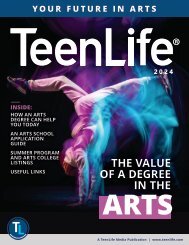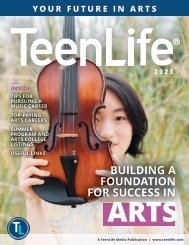TeenLife 2024 Guide to Summer Programs
TeenLife is excited to announce our Guide to Summer Programs for 2024! Check out these amazing opportunities and learn more about how you can make your next summer the most unforgettable one yet!
TeenLife is excited to announce our Guide to Summer Programs for 2024! Check out these amazing opportunities and learn more about how you can make your next summer the most unforgettable one yet!
Create successful ePaper yourself
Turn your PDF publications into a flip-book with our unique Google optimized e-Paper software.
But you’re not a runner — the most fitness you get is walking<br />
between classes — so you know being able <strong>to</strong> run that<br />
5K is going <strong>to</strong> take some work and be a bit of a challenge.<br />
In other words, you’ll need <strong>to</strong> step out of your comfort<br />
zone, or your place of greatest security, and get uncomfortable<br />
in order <strong>to</strong> achieve that particular goal.<br />
How do you know where that boundary is — and is the<br />
“comfort zone” even a real thing?<br />
The idea of comfort zones is rooted in research conducted<br />
by psychologists Robert M. Yerkes and John Dillingham<br />
Dodson in 1908. They developed the Yerkes–Dodson Law,<br />
which states that performance increases as stress increases,<br />
and performance decreases as stress decreases.<br />
However, at a certain point, high levels of stress inhibit<br />
performance.<br />
In the context of our 5K example, this means that while<br />
you may just want <strong>to</strong> just walk on a treadmill <strong>to</strong> train,<br />
there’s not much stress in doing so and therefore no<br />
increase in performance. However, when you apply<br />
stress by upping the speed on the treadmill, it gets a little<br />
harder and you have <strong>to</strong> jog.<br />
Now you’re actually training. But, setting the speed of the<br />
treadmill <strong>to</strong>o high <strong>to</strong> start won’t be beneficial and may result<br />
in injury or propelling you off the treadmill al<strong>to</strong>gether.<br />
THE BENEFITS OF LEAVING YOUR<br />
COMFORT ZONE<br />
As you train for your 5K, you can see how speeding up<br />
your walking pace and pushing yourself <strong>to</strong> jog — getting<br />
outside your comfort zone — can help you develop the<br />
fitness, stamina, and mental fortitude <strong>to</strong> run your race.<br />
But there are a number of benefits <strong>to</strong> moving outside<br />
of your comfort zone and challenging yourself <strong>to</strong> grow<br />
beyond just crossing the finish line.<br />
Achieving your goals. Not everything you want <strong>to</strong><br />
achieve in life will be easy. By moving beyond your comfort<br />
zone in<strong>to</strong> the growth zone, you’ll be able <strong>to</strong> do just<br />
that: grow. You’ll find yourself becoming more productive,<br />
achieving more, and reaching the goals you set for<br />
Cornell University<br />
<strong>2024</strong><br />
APPLY NOW!<br />
Precollege Studies<br />
• Get a head start on college by earning 3 <strong>to</strong> 8<br />
credits and a Cornell transcript<br />
• Immerse yourself in rigorous courses taught<br />
by <strong>to</strong>p Cornell faculty<br />
• Prep for college applications with<br />
one-on-one admissions counseling<br />
• Improve your college study skills<br />
during engaging classes<br />
• Explore potential majors and<br />
plan for your future<br />
Courses offered between<br />
June 3 and August 6, <strong>2024</strong><br />
Limited financial aid is available.<br />
Choose from dozens of<br />
undergraduate courses in<br />
Arts and Architecture,<br />
Business and Hospitality,<br />
Health and Humanities,<br />
International Relations,<br />
Science and Technology,<br />
Social Change,<br />
Veterinary Medicine,<br />
and more!<br />
Courses are subject <strong>to</strong> change.<br />
precollege.cornell.edu











